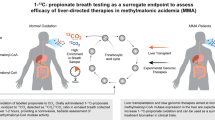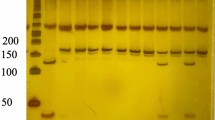Abstract
Extract: Propionate metabolism in human skin fibroblasts was studied in cells from three controls and one patient with methylmalonic acidemia. In the control cells, propionate-2-14C was metabolized to succinate and thence into the citric acid cycle, as indicated by the appearance of the C label in CO2, succinate, aspartate, and glutamate. The patient's fibroblasts accumulated methylmalonate and failed to convert the C label as readily into CO2, aspartate, and glutamate.
Speculation: Human skin fibroblasts cultured from a patient with methylmalonic acidemia offer an in vitro technique of pinpointing the defective site in this disorder. Furthermore, the kinetic properties of the mutant enzyme can be readily investigated.
Similar content being viewed by others
Log in or create a free account to read this content
Gain free access to this article, as well as selected content from this journal and more on nature.com
or
Author information
Authors and Affiliations
Rights and permissions
About this article
Cite this article
Morrow, G., Mellman, W., Barness, L. et al. Propionate Metabolism in Cells Cultured from a Patient with Methylmalonic Acidemia. Pediatr Res 3, 217–219 (1969). https://doi.org/10.1203/00006450-196905000-00005
Issue date:
DOI: https://doi.org/10.1203/00006450-196905000-00005
Keywords
This article is cited by
-
Inborn errors of cobalamin metabolism: Effect of cobalamin supplementation in culture on methylmalonyl CoA mutase activity in normal and mutant human fibroblasts
Biochemical Genetics (1979)
-
Methylmalonic acidemia
European Journal of Pediatrics (1978)



